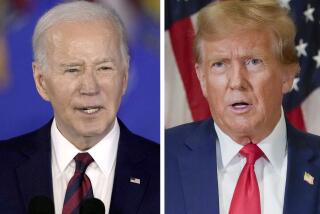1988 REPUBLICAN NATIONAL CONVENTION : Both Parties Skirt Election Spending Law
- Share via
NEW ORLEANS — Once upon a time, an idealistic group of Americans thought they could ban big-money givers from presidential politics. Being congressmen, they even passed a law about it. So much for laws.
Earlier this summer, Democratic money chief Robert Farmer announced that he planned to raise $50 million from private donors to help elect presidential nominee Michael S. Dukakis. GOP leaders cried foul. This week, they announced their response: They will try to raise $98 million. Already, they have about $40 million in hand, Philip S. Smith, finance committee executive director, said Tuesday.
All this money is raised through what charitably are considered loopholes in the campaign spending laws Congress passed after the Watergate scandal. Those who are less charitable, like Common Cause President Fred Wertheimer, call what both parties are doing “simply illegal.”
$46 Million Allowed
Under the post-Watergate reform law, the Democrats and Republicans each get about $46 million to run their presidential campaigns. As the law was written, that money was designed to be all the candidates would spend.
But the federal law does not limit what state parties may spend or where they get their funds. As long as the state parties do not directly subsidize the presidential candidate’s budget, they can spend money for “party building” activities, expenses that, in theory, benefit not just the presidential candidate, but the entire ticket.
Under that rubric, the state parties have begun to finance more and more of the presidential campaigns: telephone banks, get-out-the-vote drives, field organizations, advertising, almost everything, in fact, beyond the candidate’s airplane and his campaign manager’s salary.
“What’s going on here is that both parties are waging multimillion-dollar illegal money campaigns during the presidential race,” Wertheimer said. If the Federal Election Commission does not step in to stop the fund raising, which it so far steadfastly has refused to do, “Congress and the country will face the question in early 1989: Do you really want to go back to Watergate?” Wertheimer said.
Talked of Going to Court
Back when Farmer first announced his ambitious plans, the Republicans seemed to take Wertheimer’s view and even talked of going to court to block the Democratic fund raising. This week, however, they revealed that they had changed their minds and would try to go Farmer one better.
The Republican National Committee has a considerably larger budget than the Democrats for its regular expenses, so not all the $98 million will be available to help expected Republican presidential nominee George Bush’s campaign. Still, if the goals are fully met, which could be difficult, the new targets would guarantee that the Republicans will not be outspent by the Dukakis campaign.
What the parties are doing is not governed by federal contribution limits or federal disclosure rules. Both parties say they will disclose what they are doing, but events this week demonstrated that that promise has loopholes too.
Report for June, July
The Democrats on Tuesday released a report showing all the money they have raised and spent during June and July. They plan another report covering further months but the reports will be released quarterly, said party spokeswoman Julie Anbender. That makes the next report due Nov. 15--conveniently one week after the election.
As for the GOP, “we don’t print out listings” but will allow reporters to inspect records at party headquarters in Washington, Smith said. But, he cautioned, that policy applies only to the money-raising side, not to spending. “We do like to keep spending strategies closely held,” he said.
Asked whether withholding information until after the election met his often-voiced promise of “full disclosure,” Farmer on Tuesday said he would “discuss it further with Paul Kirk,” the Democratic national chairman.
Several Big Contributors
The Democratic report Tuesday showed $100,000 contributions from several major Southern California donors, including MCA studio chief Lew Wasserman; Carl Rheuban of Deauville Savings & Loan, who is one of the Jewish community’s most prominent fund-raisers; Susie Field, wife of movie producer Ted Field; developer Eli Broad, a close friend of Sen. Alan Cranston, and stockbroker Howard Sterling and his wife, Linda.
The report contains almost no detail about how the money was spent, however, just broad categories of expenditures and lump-sum transfers to various state party organizations.
Last year, a federal judge ruled in a suit brought by Common Cause that the FEC should regulate such fund raising and spending more stringently. So far, the FEC has declined to act, and Common Cause on Friday plans to ask the judge to give the agency a deadline.
More to Read
Get the L.A. Times Politics newsletter
Deeply reported insights into legislation, politics and policy from Sacramento, Washington and beyond. In your inbox twice per week.
You may occasionally receive promotional content from the Los Angeles Times.









